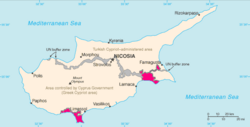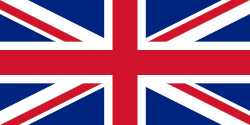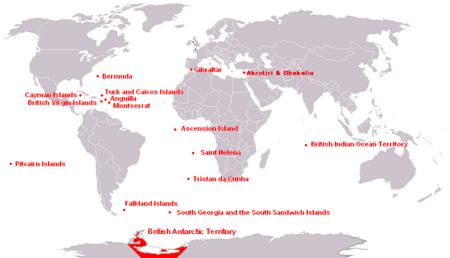Akrotiri and Dhekelia
|
The Sovereign Base Areas of Akrotiri and Dhekelia
|
||||||
|---|---|---|---|---|---|---|
|
||||||
| Anthem: "God Save the Queen" |
||||||
 Akrotiri and Dhekelia Sovereign Base Areas indicated in pink.
|
||||||
| Capital | Episkopi (administrative centre) | |||||
| Official languages | English, Greek | |||||
| Government | Sovereign Base Areas | |||||
| - | Administrator | Richard Lacey | ||||
| British overseas territory |
||||||
| - | Established | 1960 | ||||
| Area | ||||||
| - | Total | 254 km2 98 sq mi |
||||
| Population | ||||||
| - | estimate | 7,000 Cypriots, 7,500 British military personnel and families | ||||
| - | Density | n/a/km2 (n/a) n/a/sq mi |
||||
| Currency | Euro (EUR) |
|||||
| Time zone | EET (UTC+2) | |||||
| - | Summer (DST) | EEST (UTC+3) | ||||
| Internet TLD | n/a | |||||
| Calling code | 357 | |||||
The Sovereign Base Areas of Akrotiri and Dhekelia are two UK-administered areas on the island of Cyprus that comprise the Sovereign Base Areas military bases of the United Kingdom. The bases were retained by the UK following the granting of independence and the eventual transition of Cyprus from a crown colony to an independent sovereign state. The United Kingdom demanded and succeeded in continuing to occupy a portion of Cyprus in the form of military bases because of the strategic location of Cyprus in the Mediterranean Sea in pursuit of UK interests.
The bases are split into Akrotiri (Greek: Ακρωτήρι; Turkish: Agrotur, along with Episkopi Garrison, is part of an area known as the Western Sovereign Base Area or WSBA) and Dhekelia (Greek: Δεκέλεια; Turkish: Dikelya, along with Ayios Nikolaos, is part of the Eastern Sovereign Base Area or ESBA).
Contents |
History
The Sovereign Base Areas were created in 1960 by the Treaty of Establishment, when Cyprus achieved independence from the British Empire. The United Kingdom desired to retain sovereignty over these areas, as this guaranteed the use of UK military bases in Cyprus, including RAF Akrotiri, and a garrison of the British Army. The importance of the bases to the British is based on the strategic location of Cyprus, at the eastern edge of the Mediterranean, close to the Suez Canal and the Middle East; the ability to use the RAF base as staging post for military aircraft; and for general training purposes.
In 1974, Turkey invaded the North of Cyprus, leading to the establishment of the internationally unrecognised Turkish Republic of Northern Cyprus. However, this did not affect the status of the bases, and the British, although being one of the guaranteeing powers of the Republic of Cyprus, were not involved in the fighting. Greek Cypriots fleeing from the Turks were permitted to travel through the Dhekelia base, and were given humanitarian aid. The Turkish advance halted when it reached the edge of the base area.
The Southern part of the Famagusta province, which includes the resort town of Ayia Napa remained in Greek hands. The occupation of the city of Famagusta gave way to a development of the tourist industry of the southern part of Famagusta province, including resorts like Protaras, Ayia Napa, Paralimni and others that were small villages before 1974.
|
||||||||||||||||||||
Dispute with Cyprus
Cyprus has occasionally demanded the return of Akrotiri and Dhekelia, citing that the bases take up a large amount of territory that could be used for civilian development. For four years after Cypriot independence in 1960, the British government supported the Republic of Cyprus financially. After the intercommunal conflict of 1963-64 it stopped, claiming there was no guarantee that both communities would benefit equally from that money. The Cypriot government is still claiming money for the years from 1964 to now although to date has taken no international legal action to test the validity of its claim. Estimates for the claimed debt range from several hundred thousand to over one billion euro.
In July 2001, violent protests were held at the bases by local Cypriots, angry at British plans to construct radio masts at the bases, as part of an upgrade of British military communication posts around the world. Locals had claimed the masts would endanger local lives and cause cancer, as well as have a negative impact on wildlife in the area. The British government denied these claims.
The UK has shown no intention of surrendering the bases, although it has offered to surrender 117 square kilometres (45 square miles) of farmland as part of the rejected Annan Plan for Cyprus. Today, around 3,000 troops of British Forces Cyprus are based at Akrotiri and Dhekelia. Ayios Nikolaos Station, in the ESBA, is a GCHQ electronic intelligence listening station of the UKUSA intelligence network.[1]
The election of communist Dimitris Christofias as Cypriot president in February 2008 has prompted concern in Britain. Christofias has pledged to remove all foreign military forces from the island as part of a future settlement of the Cyprus dispute, calling the British presence on the island a "colonial bloodstain".[2]
Controversy
British forces in Akrotiri and Dhekelia have been involved in a number of controversies since their arrival. In 1956, according to "at least one survivor" during the Suez Crisis, Egyptian guerrillas were flown into Larnaca for interrogation and torture.[3]
In September 1994, a young Danish tour guide named Louise Jensen was dragged from her boyfriend by Allan Ford, Justin Fowler and Geoff Pernell, members of the Royal Green Jackets, raped and murdered. The soldiers were convicted and sentenced by a Cypriot court to 25 years, but released after 12 years.[4][5]
Constitution and governance
The SBAs were retained in 1960 as military bases under British sovereignty,[6][7] not as ordinary colonial territories.
This is the basic philosophy of their administration as declared by Her Majesty's Government in 'Appendix O' to the 1960 treaty with Cyprus, which provided that the British government intended:
- Not to develop the Sovereign Base Areas for other than military purposes.
- Not to set up and administer "colonies".
- Not to create customs posts or other frontier barriers between the Sovereign Base Areas and the Republic.
- Not to set up or permit the establishment of civilian commercial or industrial enterprises except insofar as these are connected with military requirements, and not otherwise to impair the economic commercial or industrial unity and life of the Island.
- Not to establish commercial or civilian seaports or airports.
- Not to allow new settlement of people in the Sovereign Base Areas other than for temporary purposes.
- Not to expropriate private property within the Sovereign Base Areas except for military purposes on payment of fair compensation.[8]
The bases have their own legal system, distinct from the UK and Cyprus. This consists of the laws of the Colony of Cyprus as at August 1960, amended as necessary. The laws of Akrotiri and Dhekelia are kept, as far as possible, the same as the laws of Cyprus. The Court of the Sovereign Base Areas is concerned with non-military offences committed by any person within Akrotiri and Dhekelia, and law and order is maintained by the Sovereign Base Areas Police, while military law is upheld by the Cyprus Joint Police Unit.
Politics
According to the Ministry of Defence, "Because the SBAs are primarily required as military bases and not ordinary dependent territories, the Administration reports to the Ministry of Defence in London. It has no formal connection with the Foreign and Commonwealth Office or the British High Commission in Nicosia, although there are close informal links with both offices on policy matters."[9]
The bases are administered by the Administrator of the Sovereign Base Areas, who is the Commander of British Forces Cyprus (from 2006 Air Vice-Marshal R Lacey). The Administrator is officially appointed by the British monarch, on the advice of the Ministry of Defence. The Administrator has all the executive and legislative authority of a Governor of an overseas territory. A Chief Officer is appointed, and is responsible to the Administrator for the day-to-day running of the civil government. No elections are held in the Bases, although British citizens are normally entitled to vote in United Kingdom elections (as British Forces or overseas electors).
|
|||||||||||
Geography


Akrotiri and Dhekelia cover 3% of the land area of Cyprus, a total of 254 km² (98 square miles) (123 km² (47.5) at Akrotiri and 131 km² (50.5) at Dhekelia). 60% of the land is privately owned, either by British or Cypriot citizens. The other 40% is owned by the Ministry of Defence, or is classed as Crown land. In addition to Akrotiri and Dhekelia themselves, the Treaty of Establishment also provides for the continued use by the British Government of certain facilities within Cyprus, known as Retained Sites.
Akrotiri is located in the south of the island, near the city of Limassol (or Lemesos). Dhekelia is in the southeast, near Larnaca. Both of these areas include military bases, as well as farmland and some residential land. Akrotiri is surrounded by territory controlled by the Republic of Cyprus, but Dhekelia also borders on the United Nations (UN) buffer zone and the Turkish-occupied part of the island.
Ayia Napa lies to the East of Dhekelia. The villages of Xylotymbou and Ormidhia, also in the Republic of Cyprus, are enclaves surrounded by Dhekelia SBA. The Dhekelia Power Station, divided by a British road into two parts, also belongs to Cyprus. The northern part is an enclave, like the two villages, whereas the southern part is located by the sea, and therefore not an enclave, though it has no territorial waters of its own.
Demographics
When the bases were being established, the boundaries were drawn up to avoid centres of population. However, around 14,000 people live in the bases. Around 7,000 native Cypriots live in the bases, who either work in the bases themselves, or on farmland within the boundaries of the bases. The British military and their families make up the rest of the population.
There is no specific citizenship available for the bases, although some people may be able to claim British Overseas Territories citizenship (BOTC) status. Unlike all other British territories, BOTCs connected solely with the Sovereign Base Areas do not have any entitlement to full British citizenship.
Under the terms of the 1960 agreement with Cyprus establishing the Sovereign Base Areas, the United Kingdom is committed not to use the Areas for civilian purposes. This was stated in 2002 as the primary reason for the exclusion of the Areas from the scope of the British Overseas Territories Act 2002.
Economy
There are no economic statistics gathered for Akrotiri and Dhekelia. The main economic activities are the provision of services to the military, as well as limited agriculture. On 1 January 2008 Akrotiri and Dhekelia adopted the euro along with the rest of Cyprus, despite not being part of the European Union. The Sovereign Base Areas are the only areas under British administration to use the euro.[10]
Media
A weekly community newspaper, The Cyprus Lion is sold in both SBAs and in shops. BFBS Radio 1 and 2 are broadcast on FM and can be widely received in Cyprus, but the BFBS Television signal has been confined to the SBAs or encrypted since 1997, for copyright reasons.
References
- Vassilis K. Fouskas. 2003. Zones of Conflict: U.S. Foreign Policy in the Balkans and the Greater Middle East. Pluto Press. ISBN 0-7453-2030-9. Pp. 93, 111
Footnotes
- ↑ The UKUSA signals intelligence system is sometimes known as 'ECHELON,' which is a codeword used by the system whose exact status is not clear. Jeffrey Richelson & Desmond Ball, The Ties the Bind: Intelligence Cooperation between the UKUSA Countries, Unwin Hyman, Boston/London and others, 1990, p.194 note 145.
- ↑ "Cyprus elects its first communist president", The Guardian, 25 February 2008.
- ↑ How electronic eavesdropping keeps a small part of Cyprus forever British The Independent retrieved February 27 2008
- ↑ "Soldier free after Cyprus killing", BBC (2006-08-14). Retrieved on 2008-02-04.
- ↑ "Parents vent fury at early release of daughter's killers", Guardian Unlimited (2006-08-19). Retrieved on 2006-09-17.
- ↑ https://www.cia.gov/library/publications/the-world-factbook/geos/ax.html
- ↑ https://www.cia.gov/library/publications/the-world-factbook/geos/dx.html
- ↑ SBA website
- ↑ SBA website
- ↑ Theodoulou, Michael. (December 27, 2007). Euro reaches field that is for ever England, Times Online. Accessed January 4, 2008.
See also
- British overseas territories
- Postal Orders of the Akrotiri Sovereign Base Area (The numismatic history of the Akrotiri SBA.)
- Postal Orders of the Dhekelia Sovereign Base Area (The numismatic history of the Dhekelia SBA.)
- Sovereign Base Areas Customs
- Sovereign Base Areas Police
External links
- Wikimedia Atlas of Akrotiri and Dhekelia
- Sovereign Base Areas Administration web-pages
- BBC News- "UK offers to cede Cyprus land"
- BBC News- "Cyprus protesters clash at UK base"
- Akrotiri entry at The World Factbook
- Dhekelia entry at The World Factbook
- - The Princess Mary's Hospital RAF Akrotiri
|
|||||||||||||||||


